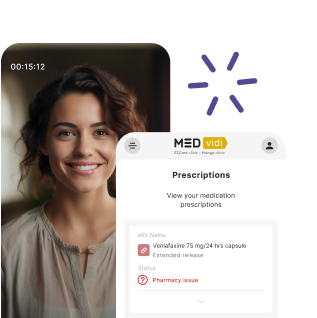Highlights
- The four most common medications prescribed for anxiety are serotonin-norepinephrine reuptake inhibitors (SNRIs), selective serotonin reuptake inhibitors (SSRIs), beta-blockers, and benzodiazepines.
- SSRIs are a widely prescribed first-line medication with fewer side effects than others.
- Medication is recommended for anxiety disorder treatment if symptoms are severe, affecting the person’s daily functioning, or if therapy alone is not effective.
- Some anxiety prescription medications will involve ongoing daily medication, while others will be taken short-term or as needed, for example, in the case of panic attacks.
You have recently been diagnosed with stress and anxiety. In some ways, this is a relief, but also overwhelming; you’d like to know more about controlling this anxiety disorder and are wondering if you need anxiety medication.
You’ve done a quick Google search, and the number of anxiety medication names is mind-boggling. Although the only way to get anxiety medication is through your healthcare provider, and they will ultimately determine what to take for anxiety, you can have a more informed discussion if you know possible options before the appointment.

The Role of Medication in Anxiety Treatment
The Anxiety and Depression Association of America (
Anxiety disorders are mental disorders that result from
You are not alone;
In the 2013 revised diagnostic and statistical manual (DSM-5), the American Psychiatric Association included the following common subgroups of anxiety disorders:
It is important to know which specific anxiety disorder you have because it might influence your treatment plan.
What Does Anxiety Medication Do?
You may have also heard anxiety medication referred to as anti-stress medication, anxiolytics, or calming medication. They’re all the same thing, but there are many types, each working differently to reduce anxiety or make it go away.
Some types calm nerves by increasing feel-good chemicals in the brain and spinal cord (central nervous system), and others block the action of other substances, slowing down the brain’s agitation or the body’s response to anxiety.
What Else Can I Do Before Trying Medication?
Other options that ease anxiety symptoms are professional therapy, joining support groups, relaxation techniques, meditation, and deep breathing exercises. If none of these are working, you might discuss it with your healthcare provider to learn whether you may need anxiety medication and if you qualify for it. With MEDvidi, you can consult with an experienced online anxiety specialist within 24 hours and receive a personalized treatment plan, all from the comfort of your home.
Types of Anxiety Medications
The recommendations for medications to treat anxiety are not as straightforward as “always use this one first, and if that doesn’t work, try this one next.” Every person with anxiety and their circumstances are different.
Let’s look at the classes or types of anxiety medications that your doctor may consider.
Antidepressants
Selective Serotonin Reuptake Inhibitors (SSRIs)
What SSRIs Are and How They Work
Selective serotonin reuptake inhibitors (SSRIs) are a type of antidepressant and anti-anxiety medication that
SSRI antidepressant medication is the most popular medication class for treating anxiety.
When They Start Working and How Well They Work
You will generally feel a difference after
They are a first-line long-term anxiety medication for
The dosage is chosen individually; never exceed the prescribed dose.
The best evidence to support long-term and short-term relief of anxiety is best obtained through the use of SSRI medication. Although these medications do require some additional time to take effect, they help patients obtain improved relief from anxiety in both the long and short-term once they come to an effective level. It's best to have an in-depth conversation with your healthcare provider to cater a plan that is right for your unique situation."

Examples of SSRIs
Citalopram, escitalopram, fluoxetine, fluvoxamine, paroxetine, and sertraline.
Side Effects
- Nausea and upset stomach
- Headache
- Feeling emotionally numb
- Sexual problems like weak erections or delayed ejaculation
- Weight gain
- Sweating
- Yawning
To decrease the chance of these side effects, your medical provider may start you on low-dose medication and increase it after a week or two.
There are also some possible
- Increased risk of suicide in suicidal patients
- Dangerous changes in heart rhythm
Serotonin syndrome[6] from toxic levels of serotonin. It is rare but can happen when SSRIs are used with other antidepressants or ADHD stimulant medication
Pros of SSRIs
- Side effects are not serious, and most last only a few weeks
- Non-drowsy
- Treat depression and obsessive-compulsive disorder, which can co-exist with anxiety
Cons of SSRIs
- Take a long time to start working
- Might initially make you feel temporarily agitated or more anxious
- Sexual problems and emotional numbness often persist during treatment
Serotonin-Norepinephrine Reuptake Inhibitors (SNRIs)
What They Are and How They Work
Some medicines in this class are also effective medications to treat generalized anxiety disorder and can be used first-line. They are antidepressants that increase the feel-good serotonin and norepinephrine between the brain cells.
Learn more: SSRIs vs SNRIs
Examples of SNRIs
Venlafaxine and duloxetine are examples of SNRIs registered by the Food and Drug Administration (FDA) to treat anxiety disorders. Desvenlafaxine is used off-label.
When They Start Working
They should start to make you feel calmer after 1 to 2 weeks, with the full effect from about 4 to 6 weeks.
Side Effects
Common side effects of SNRIs:
- Nausea
- Dry mouth
- Constipation
- Dizziness
- Sweating
- Sexual problems
Life-threatening Side Effects of SNRIs
Serotonin syndrome[6] from toxic levels of serotonin. It is rare but can happen when SNRIs are used with other antidepressants or ADHD stimulant medication- Duloxetine can cause liver damage, usually in people with liver problems
- Young adults (< 24 years) are at risk of increased suicidal thoughts
Pros of SNRIs
- Treat depression, which often co-exists with anxiety
- Work well for
pain syndromes[7] like fibromyalgia and nerve pain - Non-drowsy
Cons of SNRIs
- A high possibility of withdrawal effects, so they need to be tapered down more carefully than SSRIs
- Blood pressure should be monitored in patients with
high blood pressure[8] when the venlafaxine dose is increased
Tricyclic Antidepressants (TCAs)
What They Are and How They Work
TCAs, one of the oldest classes of antidepressants, are not FDA-approved for the treatment of anxiety disorders and are generally used off-label. They are second-line agents for the treatment of depression and might be helpful when treating a mixed depression-anxiety profile that doesn’t respond well to SSRIs and SNRIs.
Like SNRIs, they increase the feel-good serotonin and norepinephrine in the nervous system. Unfortunately, their action doesn’t end there; they also impact cholinergic, adrenergic, and histamine receptors. You don’t need to remember these names, but know that this action leads to bad side effects.
Examples of TCAs
Imipramine and amitriptyline.
When They Start Working and How Well They Work
They reach maximum effect from 2 to 8 hours and can stay in your system for more than 24 hours; this increases the risk of toxicity and overdose.
Common Side Effects of TCAs
- Dry mouth
- Constipation
- Difficulty passing urine
- Blurred vision
- Dizziness
- Low blood pressure
- Increased appetite and weight gain
- Tiredness and sleepiness
- Cognitive impairment (a fancy medical term for confusion or poor memory)
Life-threatening Side Effects of TCAs
- Dangerous changes in heart rhythm in patients with heart problems
- Seizure in people with epilepsy
- Young adults (< 24 years) are at risk of increased suicidal thoughts
Pros of TCAs
- Help with insomnia in patients with anxiety
- Treat depression, pain syndromes, muscle tension, migraines, and irritable bowel syndrome
Cons of TCAs
Monoamine Oxidase Inhibitors (MAOIs)
MAOIs were the first antidepressants ever introduced in the 1950s.
They are no longer popular medications to treat anxiety and depression and are
Atypical Antidepressants
Trazodone
Because one of trazodone’s side effects is drowsiness, it might help with anxiety-associated insomnia.
Mirtazapine
- Drowsiness, making it suitable for insomnia
- Significant weight gain, which limits its use in many people
Anxiolytics
Benzodiazepines
What They Are and How They Work
It’s complicated, so we won’t get into the details, but benzodiazepines work by
Examples of Benzodiazepines
Diazepam, lorazepam, alprazolam, clonazepam, and midazolam.
When They Start Working and How They Work
Benzodiazepines work
"Although benzodiazepines help to lessen panic and anxiety quickly, over time, they can actually cause a paradoxical worsening of anxiety. This oftentimes can be confusing to patients.
This is one of the reasons why it is recommended not to rely solely on a benzodiazepine for control of panic and anxiety. Benzodiazepine therapy is typically recommended more in the setting to help control acute anxiety or to help bridge to SSRI effectiveness. In other words, they are meant to be short-term medications that can be used while other anxiety medications are becoming effective. Talk to your healthcare provider to come up with a plan for your situation."

Common Side Effects of Benzodiazepines
- Drowsiness
- Confusion
- Fainting
- Shakes and tremors
- Nausea and upset stomach
Pros of Benzodiazepines
- Bring down symptoms of anxiety quickly compared to some other medications
- Can be taken as needed (‘PRN,’ a fancy abbreviation that you might see on a script, meaning “as necessary”)
- Help with insomnia and muscle tension, both common when anxious
- Given in different ways: as tablets, injections, or in a drip
Cons of Benzodiazepines
- Shouldn’t drive or operate machinery because of the risk of accidents
- Suddenly stopping benzodiazepines increases the risk of severe withdrawal symptoms
Taking benzodiazepines long-term can lead to addiction, physical dependence, and substance abuse
Buspirone
What It Is and How It Works
Buspirone has been around since the 1970s and has
It partially stimulates serotonin receptors, simulating the neurotransmitter’s feel-good action. It is used as a second-line treatment for GAD after SSRIs and SNRIs.
When It Starts Working
It takes 2 to 4 weeks to start working, so it cannot be used for anxiety attacks.
Common side effects of Buspirone
- Dizziness
- Drowsiness
- Nausea
- Headache
Beta-Blockers
What They Are and How They Work
Beta-blockers work by
- A faster heart rate
- Feeling shortness of breath or breathing faster
- Feeling sweaty or flushed
- Having tremors or shaking
The FDA does
Examples
Propranolol is the most common beta-blocker used for anxiety.
When Propranolol Starts Working and How It Works
Patients typically start to feel an effect
Note that individual responses to any of the medications mentioned in the article may vary. Consult your healthcare provider and never exceed the prescribed dose.
Common Side Effects
- Low heart rate
- Wheezing
- Dizziness
- Tiredness
- Nausea and upset stomach
- Erection problems
- Cold hands and feet
Life-threatening Side Effects
These are rare but are related to the effect on the heart, blood vessels, and lungs, usually in
Pros
You can take it in advance, as necessary (PRN), to prevent the physical symptoms.
Cons
This medication has little effect on the emotional side of anxiety.
Other Medications
Antihistamines
Hydroxyzine
It might seem strange that an antihistamine, which is usually used for allergic reactions, could be used to treat anxiety, but
The side effects are usually
- Dry mouth
- Drowsiness
- Headache
- Rashes and allergies
Anticonvulsants / Antiseizure Medicines
Gabapentin
Gabapentin is commonly prescribed to manage anxiety, but it is
It has many
- Feeling off-balance
- Dizziness
- Tiredness and sleepiness
- Nausea and upset stomach
- Headache
- Constipation
- Weight gain
- Sexual problems
- Depression
In addition, there are possible life-threatening side effects, such as:
- Severe allergic reactions
- Life-threatening rashes
- Muscle breakdown
- Increased suicide risk
10 Commonly Prescribed Medications for Anxiety
So far, we’ve discussed classes or types of anxiety medication; now, let’s look at commonly prescribed individual medicines.
Table 1. Anxiety medication list of commonly prescribed drugs
|
Medication name |
Class |
FDA-approved uses |
Other uses |
|
Alprazolam |
Benzodiazepine |
|
— |
|
Clonazepam |
Benzodiazepine |
|
Also used for epilepsy |
|
Lorazepam |
Benzodiazepine |
|
Given in a drip for epilepsy emergencies |
|
Propranolol |
Beta-blocker |
|
High blood pressure Angina and heart attacks Abnormal heart rhythms Migraine Tremors |
|
Buspirone |
Other anxiolytics |
GAD |
Might reduce the sexual side effects of SSRIs |
|
Hydroxyzine |
Antihistamine |
Anxiety disorders |
Allergic itchy skin conditions |
|
Gabapentin |
Antiepileptic |
Off-label for anxiety disorders |
Epilepsy Restless leg syndrome Shingles nerve pain |
|
Sertraline |
SSRI |
|
Major depressive disorder (MDD) PTSD Premenstrual dysphoric disorder (PMDD) |
|
Escitalopram |
SSRI |
|
MDD |
|
Diazepam |
Benzodiazepine |
|
Given to children with fever seizures via the rectum |
Choosing the Right Medication for Anxiety
You are already anxious, so the good news is that you don’t need to worry about this; your healthcare provider will make a suggestion, and only they can prescribe anxiety medication.
In your unique situation, when choosing the best medication for anxiety, your prescribing doctor may consider the following:
- Your age.
- The type of anxiety disorder you have.
- If you have physical symptoms of anxiety.
- If you’ve been feeling anxious for a while and need long-term treatment.
- If this is a sudden stress that will pass quickly, only needing short-term treatment.
- If you’ve taken treatment previously and whether that anxiety medication worked.
- Other medical conditions you have.
- Other medications you take daily (to avoid interactions with certain medications).
- If you are at risk of substance abuse.
- If you’re female, whether you’re breastfeeding, pregnant, or planning a pregnancy.
After reading this article and understanding the differences between all the options, if something concerns you about a chosen anxiety medication, chat with your doctor about it.
How to Know If I Need Medications for Anxiety?
If you are experiencing severe anxiety that is impacting your daily life, you may qualify for a prescription for anxiety. The first step in getting a medication prescription is to make an appointment to see a medical professional, go through an assessment to get a diagnosis, and discuss suitable treatment options.
FAQs
What does taking anxiety medication feel like?
Does anxiety medication help with fear?
Does medication make anxiety go away?
What is the best anxiety medication with the least side effects?
The anxiety medications with the least side effects are selective serotonin reuptake inhibitors (SSRIs) and serotonin-norepinephrine reuptake inhibitors (SNRIs). This is why these two classes of antidepressants are the first-line options for anxiety disorders. To learn what medication can be the most suitable for you, contact your healthcare provider.
What's the best medication for anxiety attacks?
Can you take anxiety medications on an as-needed basis?
What anxiety medication can you take long-term?
Will anxiety medication help with overthinking?
Anxiety medication should help with overthinking because it is usually a symptom of anxiety. However, therapy should always be part of your treatment plan and help you work on your anxiety triggers.













